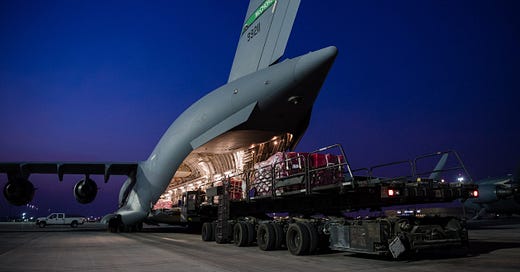Revolutionizing Logistics with AI: Insights from the U.S. Air Force
How AI is Transforming Supply Chain Optimization
Logistics is the backbone of every industry, from military operations to global supply chains. Now, AI is rewriting the rules, bringing unparalleled efficiency, precision, and speed to logistics management.
A recent collaboration between the U.S. Air Force and Space Systems Command (SSC) demonstrated how AI-driven cargo loading can reduce logistical bottlenecks, enhance readiness, and revolutionize supply chain management. The results? Cargo loading times dropped from 14 days to under an hour.
What does this mean for businesses, logistics firms, and decision-makers? Let’s explore the real-world impact of AI in logistics and how military innovations can reshape commercial supply chains.
How AI Enhances Military Logistics: The U.S. Air Force Case Study
In a groundbreaking logistics challenge, the U.S. Air Force 21st Logistics Readiness Squadron and SSC’s Installation, Logistics, and Product Support Directorate (S4) tested AI-powered cargo optimization.
🔹 The Goal: Find the fastest and most efficient way to load 111 cargo boxes into a standard ISU-90 military container with only 380 cubic feet of space.
🔹 The Challenge: Traditional cargo loading takes up to 14 days—a major constraint in rapid deployment scenarios.
🔹 The AI Solution: AI-generated optimized loading instructions, reducing manual trial and error.
📌 The Result? A 90% Reduction in Load Time. The AI-powered system cut logistics preparation time from weeks to hours, setting a new benchmark for military readiness.
Real-World Impact: Military Innovations Reshaping Civilian Supply Chains
1. Increased Efficiency: AI Eliminates Logistical Bottlenecks
AI analyzes cargo weight, dimensions, and priority levels to create the most efficient packing configuration.
Logistics managers can make real-time adjustments based on changing requirements and constraints.
📌 Commercial Implication: Retailers and e-commerce companies can use AI-driven warehouse automation to improve fulfillment speeds and reduce delivery times.
2. Enhanced Readiness: Faster Deployments & Emergency Response
Military missions require instant deployment—AI ensures critical supplies are packed, transported, and delivered with minimal delays.
AI-powered logistics optimizes cargo for different transportation modes (land, sea, air, and space).
📌 Commercial Implication: Disaster relief operations, emergency medical supply chains, and perishable goods industries can benefit from AI-driven rapid response logistics.
3. Human-AI Collaboration: The Future of Logistics Teams
AI doesn’t replace humans—it augments logistics teams by providing real-time decision-making support.
Military personnel used AI to improve manual loading strategies, proving AI can enhance human expertise rather than replace it.
📌 Commercial Implication: AI can support supply chain managers in fleet optimization, demand forecasting, and real-time route planning, improving logistics agility across industries.
Business Implications: What Leaders Should Do Now
Keep reading with a 7-day free trial
Subscribe to Reem Tech Pro to keep reading this post and get 7 days of free access to the full post archives.




